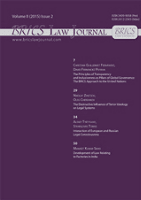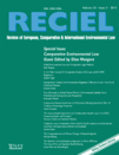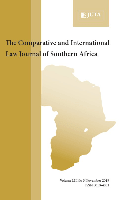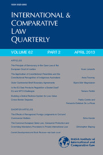
BRICS Law Journal
Scope & Guideline
Bridging Legal Perspectives in a Dynamic Region
Introduction
Aims and Scopes
- Comparative Law and Legal Frameworks:
The journal emphasizes comparative analyses of legal systems, highlighting differences and similarities in legal frameworks among BRICS countries, particularly in areas like commercial law, constitutional law, and human rights. - Emerging Technologies and Law:
A significant focus on the legal implications of emerging technologies such as digital transformation, artificial intelligence, and blockchain, addressing how these innovations are regulated and their impact on society. - International Cooperation and Development:
Exploration of legal cooperation among BRICS countries, particularly in the context of international law, trade, and development strategies that aim to enhance collaboration in a multipolar world. - Socio-Legal Issues:
The journal examines pressing socio-legal challenges such as human rights, gender discrimination, and public health law, reflecting on how these issues are addressed within the BRICS context. - Environmental and Sustainable Development Law:
A core area of focus on environmental law and sustainable development practices, including the regulation of renewable energy and the legal frameworks supporting environmental protection in BRICS nations.
Trending and Emerging
- Digital Law and Cybersecurity:
There is an increasing focus on legal issues related to digital technologies, cybersecurity, and the regulation of digital financial assets, reflecting the growing importance of these areas in the contemporary legal environment. - Human Rights and Social Justice:
Emerging themes around human rights, particularly in the context of gender discrimination and indigenous rights, indicate a growing recognition of social justice issues within BRICS nations and a commitment to addressing these challenges. - Legal Implications of Climate Change:
The journal is increasingly addressing the legal implications of climate change and environmental sustainability, showcasing a trend towards integrating environmental concerns into legal discourse and practice. - Impact of Globalization on National Laws:
A clear trend is emerging in examining how globalization affects national legal systems, particularly in the context of economic law and international trade, indicating a response to the interconnectedness of global legal frameworks. - Health Law in Crisis Situations:
The COVID-19 pandemic has spurred a significant increase in publications addressing health law and its implications for public policy, highlighting the interaction between law and public health in crisis contexts.
Declining or Waning
- Traditional Legal Doctrines and Theories:
There appears to be a waning interest in traditional legal doctrines and theoretical discussions, as the journal increasingly prioritizes practical applications and contemporary issues over classical legal theory. - Regional Legal Cooperation:
Although regional cooperation has historically been a theme, recent issues show less emphasis on cooperative legal frameworks specific to the BRICS region, possibly overshadowed by broader international legal discussions. - Historical Legal Analysis:
Papers focusing on historical perspectives of law and legal evolution in BRICS countries are becoming less frequent, suggesting a shift towards more current, pressing legal issues rather than historical retrospectives.
Similar Journals

Review of European Comparative & International Environmental Law
Empowering scholars to shape sustainable legal frameworks.Review of European Comparative & International Environmental Law is a leading academic journal published by WILEY that serves as a vital platform for scholars and practitioners in the fields of environmental law, geography, and policy analysis. With its ISSN 2050-0386 and E-ISSN 2050-0394, it provides comprehensive insights into the comparative and international aspects of environmental legislation and governance. The journal is noted for its rigorous peer-review process and has achieved commendable rankings, including Q1 in Law and Q2 in Geography, Planning, and Development in the 2023 category quartiles. Furthermore, it holds impressive Scopus rankings, placing it within the 92nd percentile for social sciences law. The scope of the journal encompasses interdisciplinary research addressing contemporary environmental challenges, making it an invaluable resource for those engaged in the development, monitoring, and policy-making around environmental law. Published since 2013 and continuing through 2024, Review of European Comparative & International Environmental Law plays a crucial role in fostering scholarly dialogue and influencing environmental policy worldwide, ensuring access to state-of-the-art research and innovative solutions for a sustainable future.

Juridical Tribune-Tribuna Juridica
Empowering Research for a Just TomorrowWelcome to the Juridical Tribune-Tribuna Juridica, an esteemed journal dedicated to the interdisciplinary exploration of legal studies, political science, and public administration. Published by EDITURA ASE in Romania, this open-access journal has been a beacon of knowledge since its inception in 2011, making scholarly research accessible to a global audience. With a robust focus on contemporary issues in law and governance, the journal is categorized in the Q2 and Q3 quartiles across several fields, highlighting its significance in Education, Law, Political Science and International Relations, and Public Administration. Its impressive ranking, standing at the 71st percentile in Law and the 60th percentile in Political Science, showcases its contribution to advancing academic discourse. The journal spans a convergence of years from 2019 to 2024, reflecting its commitment to ongoing, relevant research. Scholars, practitioners, and students alike are invited to delve into the rich resources available through this journal, fostering insights and dialogue that are crucial in today's dynamic legal and political landscape.

Revista de la Facultad de Derecho
Cultivating Interdisciplinary Insights in the Legal ArenaRevista de la Facultad de Derecho is an esteemed open-access journal published by the Universidad de la República, Facultad de Derecho, based in Montevideo, Uruguay. Since its inception in 2007, the journal has committed itself to disseminating high-quality legal scholarship, covering a wide range of topics within the field of law. With a dedication to promoting academic dialogue and advancing legal research, the journal serves as a vital resource for researchers, legal professionals, and students alike. The publication aims to foster discussions on contemporary legal issues while providing a platform for interdisciplinary insights. The journal is accessible online through its ISSN 0797-8316 and E-ISSN 2301-0665, ensuring that its content reaches a broad audience across the globe. With a focus on accessibility and scholarly rigor, the Revista de la Facultad de Derecho plays a pivotal role in advancing legal education and research in Latin America.

Ius Humani-Revista de Derecho
Fostering Innovation in Human Rights LawIus Humani-Revista de Derecho, published by Universidad Hemisferios, serves as a vital platform for discourse in the field of human rights law and its various dimensions. With an Open Access policy established since 2008, this journal ensures that scholarly articles, critical reviews, and original research are readily accessible to a global audience, fostering collaboration and innovation among researchers, professionals, and students alike. Although the journal is based in Quito, Ecuador, its reach extends internationally, making significant contributions to the understanding and application of human rights in legal frameworks. While it is still developing in terms of its HIndex and Scopus rankings, Ius Humani is poised to provide essential insights and discussions that reflect pressing legal issues and emerging trends in human rights law. Join the community of scholars engaging with this important field through Ius Humani, where knowledge is freely shared and impactful conversations are sparked.

Comparative and International Law Journal of Southern Africa-CILSA
Connecting Scholars to Shape the Future of LawComparative and International Law Journal of Southern Africa (CILSA) is a prestigious academic publication dedicated to advancing the understanding of comparative and international law within the Southern African context. Published by the University of South Africa, Institute of Foreign & Comparative Law, CILSA serves as a critical platform for scholars, practitioners, and students to explore significant legal issues and developments that impact the region and beyond. The journal's ISSN is 0010-4051, ensuring its visibility and accessibility within academic circles. While CILSA currently operates under a traditional publishing model, it remains committed to providing high-quality, peer-reviewed research that addresses pressing legal challenges and promotes informed discourse. With a mission to bridge the gap between different legal systems and encourage comparative analysis, CILSA is essential reading for anyone invested in the evolution of law in a globalized world.

International & Comparative Law Quarterly
Advancing Comparative Law Insights.International & Comparative Law Quarterly is a prestigious academic journal published by Cambridge University Press, renowned for its rigorous scholarship in the fields of law, political science, and international relations. With an impressive impact factor and classified in the Q1 category for both Law and Political Science and International Relations, the journal stands out as a leading platform for disseminating high-quality research. Established in 1952, it has been pivotal in shaping discourse around comparative and international legal frameworks through carefully curated articles, case studies, and analyses. Although not open access, its comprehensive content provides invaluable insights into contemporary legal challenges and political dynamics, making it essential reading for researchers, professionals, and students alike. With ongoing contributions from a diverse range of scholars, the journal aims to foster a deeper understanding of law in a global context and provide readers with the tools to navigate complex legal landscapes.

Istanbul Hukuk Mecmuasi
Innovating law research for tomorrow's challenges.Istanbul Hukuk Mecmuasi, published by ISTANBUL UNIV, FAC LAW, is a leading open-access journal dedicated to advancing the field of law since its establishment. With the ISSN 2636-7734 and E-ISSN 2667-6974, this journal serves as a pivotal platform for legal scholars, practitioners, and students to disseminate and access high-quality research and discussions on various aspects of law, including constitutional, private, and international law. Emphasizing accessibility, it has been providing open access to its publications since 2017, thereby promoting broader engagement and collaboration within the legal community. The journal aims to foster scholarly discourse and serves as an invaluable resource for those seeking to deepen their understanding of contemporary legal challenges in both a national and international context. With its commitment to high academic standards, Istanbul Hukuk Mecmuasi is the go-to journal for research that influences legal theory and practice.

SYDNEY LAW REVIEW
Navigating the Evolving Landscape of LawSYDNEY LAW REVIEW is a prestigious academic journal published by the Sydney Law School, dedicated to the field of legal studies and interdisciplinary analysis of law and its impact on society. With its ISSN 0082-0512 and E-ISSN 1444-9528, this journal serves as a vital resource for legal scholars, researchers, and practitioners in Australia and globally. The journal has undergone several phases since its inception in 1990, reflecting the evolving landscape of legal scholarship and policy. Although currently not an open-access publication, it remains a significant contributor to legal discourse, maintaining a Q4 ranking in the Law category as per the 2023 category quartiles. The SYDNEY LAW REVIEW encourages submissions that critically explore contemporary legal issues, thereby fostering a robust platform for academic inquiry and professional advancement.

Melbourne University Law Review
Connecting Scholars and Practitioners in LawMelbourne University Law Review, published by the MELBOURNE UNIV LAW REVIEW ASSOC, stands as a pivotal journal in the realm of legal scholarship in Australia and beyond. With an ISSN of 0025-8938 and an E-ISSN of 1839-3810, this esteemed publication has been a cornerstone for legal discourse since its inception. Designed to foster rigorous analysis and extensive debate, the journal covers diverse aspects of law, providing researchers, practitioners, and students an invaluable platform to engage with contemporary legal issues. The journal has demonstrated a commitment to high-quality scholarship, achieving a Q2 ranking in Law for 2023, further solidifying its importance within the academic community. Although not an open-access publication, the Melbourne University Law Review ensures that contributions remain accessible through institutional subscriptions, enhancing its reach and reinforcing its role as a critical resource for those dedicated to advancing legal knowledge and practice. For all stakeholders in the field of law—be they established academics or emerging professionals—this journal serves as a vital repository of innovative ideas and legal analysis.

German Law Journal
Unlocking Insights into German and EU LawGerman Law Journal, published by Cambridge University Press, stands as a leading open-access platform for scholarly discourse in the field of law, having made its content freely available since 2019. With an impressive impact factor that places it in the Q1 category for Law as of 2023, and a robust Scopus ranking of #164 out of 1025 in the social sciences category, this journal is recognized for its high-quality research and significant contributions to legal scholarship. The journal encompasses a wide array of topics pertinent to the German legal system, European Union law, and comparative legal studies, thus catering to researchers, legal practitioners, and students alike. Located in the heart of the UK, at Edinburgh Building, Shaftesbury Rd, Cambridge, this journal not only fosters academic engagement but also promotes interdisciplinary dialogues that enrich the understanding of legal principles in an evolving global context. Emphasizing accessibility and high academic standards, the German Law Journal serves as an essential resource for those seeking to explore and contribute to contemporary legal discussions.